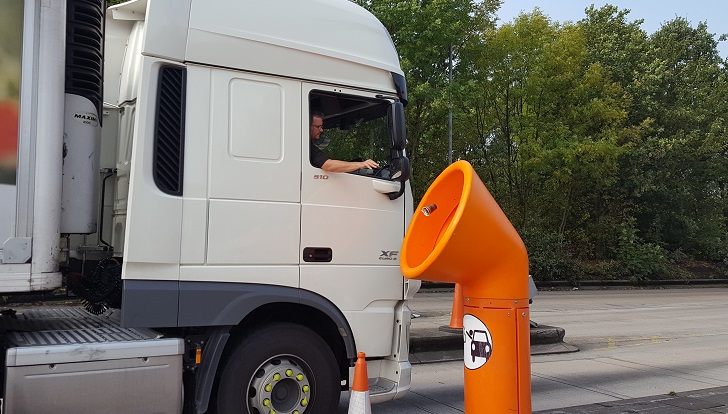New giant funnel bins at Lymm Services damaged within two days

Three of the four new giant funnel bins – installed at Lymm Services off the M6 in Cheshire with the aim of reducing the amount of littler dropped in the region – have been damaged within two days of being installed.
The damage occurred when trucks trying to leave the services hit them because the bins’ location narrowed the exit.
Highways England is installing the bins as part of an initiative in the region to tackle littering, after more than 40,000 sacks of rubbish had to be collected from motorways in the Northwest last year – an average of 108 sacks for every mile of motorway.
The window-height bins are being installed at about a dozen service areas over the next few months, with those installed at Lymm Services this week being the first.
Two different sizes of bins are being installed – ranging from 1.8 to 2.2 metres high – next to Give Way lines at the exit to service area car parks. The bins allow car and lorry drivers to reach the half-a-metre-wide funnels from their vehicles’ windows.
Earlier in the week, Paul Elliott, service delivery team leader at Highways England, had sung the praises of the bins: “We’re committed to tackling littering on our network and are installing the funnel bins at service areas in the Northwest. The bins offer another opportunity for road users to dispose of their rubbish responsibly within service areas.
“Our teams of workers do a fantastic job removing litter from motorways every year but we’d much rather they were able to spend more of their time carrying out maintenance work.
“The new giant funnel bins will make it much easier for drivers to get rid of their litter as they won’t need to leave their vehicles, and I’d urge drivers to either use the bins on the network or to take their litter home with them.”
It costs taxpayers an estimated £40 for each sack of litter collected from motorways – roughly the same cost as fixing a pothole.
Litter poses a risk to other drivers if it lands on windscreens, causes a threat to wildlife and leads to flooding if drains become blocked so litter picking is regularly carried out across the network.
Rubbish has to be collected close to fast-moving traffic – putting workers at risk – and lane closures are often needed, causing needless disruption to drivers.
Other parts of the initiative involve trialling new signs with the message ‘Workers lives are put at risk picking your litter’ and carrying out extra litter picking patrols to help tackle the issue.
However, Clean Up Britain, while welcoming the bins, noted a couple of practical concerns – so many people who buy food from services eat in transit, so extra bins aren’t necessarily capturing the rubbish that ultimately ends up on verges away from rest stops. Also, people are a pretty bad aim – which potentially means a litter problem in itself is created as people miss and the wind does its job.
